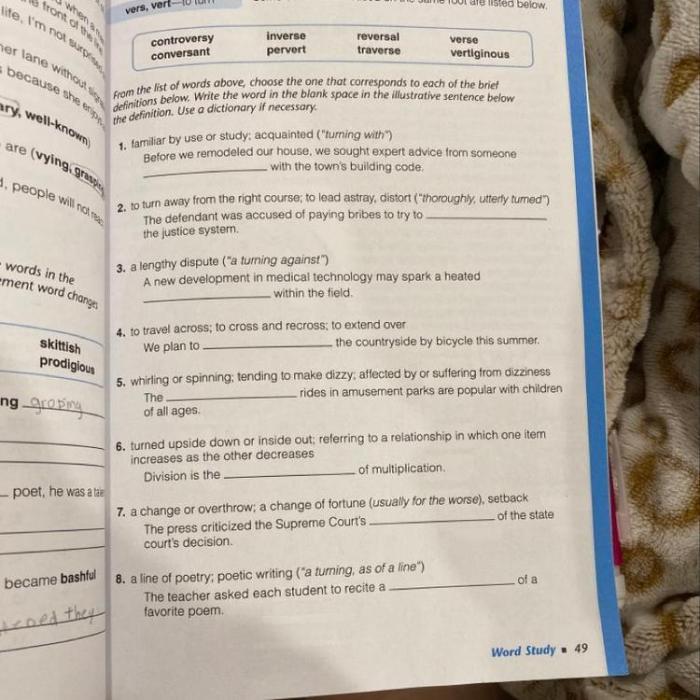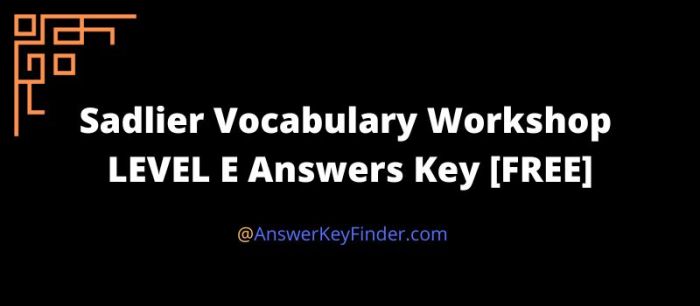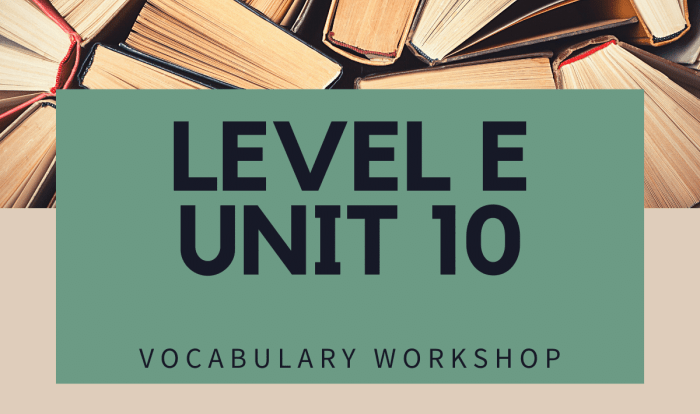Embark on an enriching vocabulary-building journey with Unit 5 Level F Vocabulary Workshop Answers. This comprehensive resource provides a structured and engaging approach to expanding your lexical repertoire.
Through a diverse range of exercises and techniques, the workshop fosters a deep understanding of vocabulary, equipping you with the skills to navigate complex texts and communicate effectively.
Unit 5 Level F Vocabulary Workshop

The Unit 5 Level F Vocabulary Workshop is designed to enhance students’ vocabulary skills. It provides a comprehensive overview of various vocabulary-building techniques and strategies.
The workshop includes a variety of exercises, including:
- Synonym and antonym identification
- Contextual clue interpretation
- Prefix and suffix analysis
- Root word recognition
- Word family exploration
- Figurative language identification
Synonyms and Antonyms
Synonyms are words with similar meanings, while antonyms are words with opposite meanings. Understanding synonyms and antonyms helps students expand their vocabulary and develop a more nuanced understanding of language.
For example, in the workshop, students may encounter the following synonym pairs:
- Happy – joyful
- Sad – sorrowful
- Big – large
And the following antonym pairs:
- Happy – sad
- Big – small
- Hot – cold
Contextual Clues
Contextual clues are hints within a text that help readers determine the meaning of unfamiliar words. The workshop teaches students to identify different types of contextual clues, including:
- Definition
- Example
- Comparison
- Contrast
For instance, in the following sentence, the definition of “elated” is provided as a contextual clue:
“The students were elated to receive their report cards.”
Prefixes and Suffixes, Unit 5 level f vocabulary workshop answers
Prefixes and suffixes are word parts that are added to the beginning or end of a word to change its meaning. The workshop introduces students to common prefixes and suffixes and teaches them how to use them to build new words.
For example, the prefix “un-” means “not” or “opposite of.” Adding it to the word “happy” creates the word “unhappy,” which means “not happy.”
Root Words
Root words are the core of words that carry their basic meaning. The workshop helps students identify root words and understand how they can be used to form new words.
For instance, the root word “mit” means “send.” Adding different prefixes and suffixes to “mit” can create words like “submit,” “transmit,” and “admit.”
Word Families
Word families are groups of words that share a common root word. The workshop teaches students to recognize word families and understand the relationships between words within a family.
For example, the word family for “mit” includes words like “submit,” “transmit,” and “admit.”
Figurative Language
Figurative language is language that uses words in a non-literal way to create a specific effect. The workshop introduces students to different types of figurative language, including:
- Similes
- Metaphors
- Personification
- Hyperbole
For example, the following sentence uses a simile to compare the speed of a car to the speed of light:
“The car sped away like a rocket.”
Vocabulary in Practice
The workshop concludes with an activity that allows students to apply the vocabulary they have learned. This activity could involve creating a vocabulary game, writing a short story using the new vocabulary, or presenting a vocabulary lesson to the class.
FAQ: Unit 5 Level F Vocabulary Workshop Answers
What is the purpose of Unit 5 Level F Vocabulary Workshop?
To enhance vocabulary skills through various exercises and techniques.
How does the workshop improve vocabulary?
By teaching synonyms, antonyms, contextual clues, prefixes, suffixes, root words, word families, and figurative language.
What are the benefits of using this resource?
Improved vocabulary, enhanced communication skills, and a deeper understanding of language.

